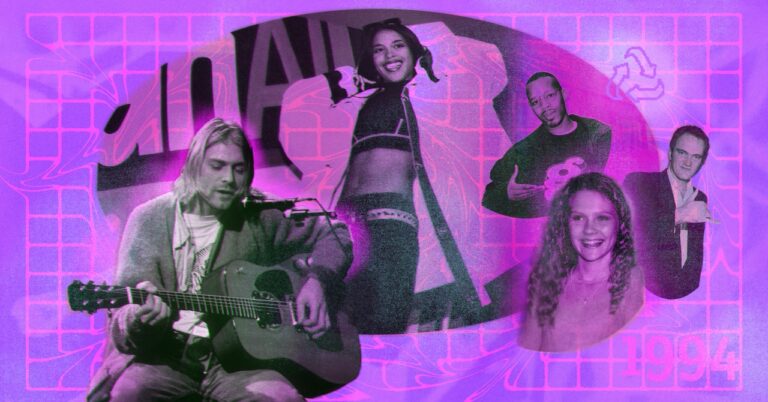In 1994, everything was going well. Music, films, television: cultural production seemed alive. The people were also very cool, or at least they managed to be cool by trying not to be. Anyway, 30 years ago I was not cool and I didn’t have much to do on Friday evening. Which is why, on April 8, 1994, I was at home watching Kurt Loder take over MTV to inform myself and everyone else that Kurt Cobain was gone.
Remembering the passing of Nirvana’s frontman might be a tearful way to go about it, but it’s a stark reminder of just how many culture-changing events there were in 1994. Born killers And pulp Fiction. Nine Inch Nails released The downward spiral a month before Cobain committed suicide. Tori Amos dropped out Under the pink a few weeks before that. Above the edge hit theaters that spring and lived in car speakers all summer since Warren G and Nate Dogg’s “Regulate” was on the soundtrack. Aaliyah released “Back & Forth”; Brandy wanted to be down; TLC continued “Waterfalls.” My so called life created its only perfect and unhappy season. Jim Carrey had three films in theaters, of varying quality: Stupid and even dumber, Ace Ventura: Pet DetectiveAnd The mask. Brad Pitt had three, two that matter: Autumn legends And Interview with the Vampire. The beginnings of Kevin Smith, Clerkpremiered at Sundance, was picked up by Harvey Weinstein’s Miramax and became a cult hit before the end of the year.
It was all anyone could talk about, culturally. It’s all there was talk about.
Except they weren’t. Above are just a few of the cultural moments that garnered national and global attention in 1994. These are the events that hit the suburbs. Some of the best artwork of the year was the slow-burn one. As C. Brandon Ogbunu and Lupe Fiasco pointed out in their test last week commemorating Nas’ 30th anniversary Illmatic, “in the early 90s, there were no hip-hop message boards. There was no social media. The legend of Illmatic was built from street corner to street corner, person to person, party to party. Despite everything, Nas was on Yo! MTV Raps.
Every once in a while, an expert pops up to scratch his chin and pontificate on whether monoculture is dead or not. The New York Times wonders if these are “TV post-water cooler” times ; Vox asks “Can monoculture survive the algorithm?“My colleague Kate Knibbs has previously written about lamenting the demise of monoculture. this is all a bit ridiculousand even if it is debatable, there is just more Today’s culture – more TikToks, more Instagram videos from Coachella, more streaming shows – there are still common denominators: Beyonce, Taylor Swift, I hate Zack Snyder’s films. Monoculture, I would say, never died; rather, it’s a zombie that haunts everything. The ghost in the machine is an unspoken desire to share something collectively, if only to tear it apart together. (See again: Taylor Swift.)


